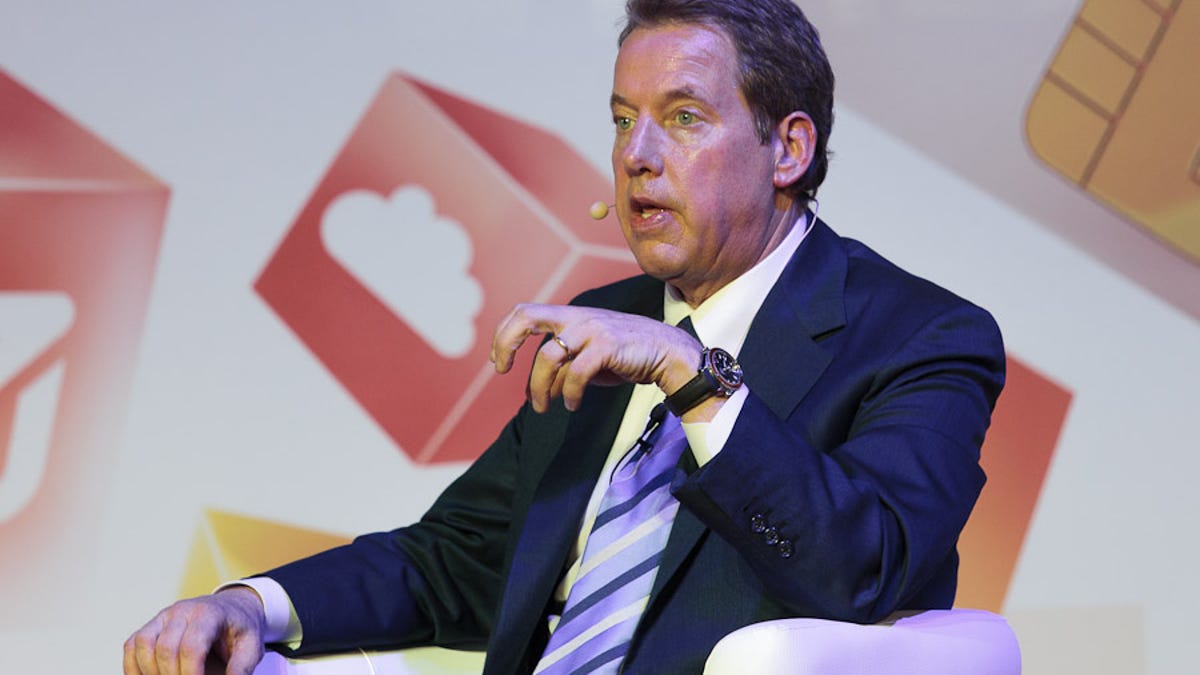Bill Ford: Computing tech will upend the auto industry
Tech will be in the driver's seat, steering the auto industry into a future with coordinated networks of self-driving cars. Without it, expect "global gridlock" to paralyze cities.

BARCELONA--Bill Ford, bitten by the Silicon Valley bug, has dreams of a fast-moving Detroit at the heart of a radical overhaul of personal transportation.
As the executive chairman of Ford Motor Company and great grandson of the company founder Henry Ford, he's got deep roots in a century-old industry. Ford predicts a future, though, in which computing and communications technology is no longer an accessory but instead a primary part of a car, and in which the auto industry works on the same time scales as the electronics industry.
There was a time when technology suppliers would have a brief window to integrate their products with a particular car model that would remain essentially unchanged for years. But no more, Ford said in a speech here at the Mobile World Congress show in Barcelona.
"That world is finished," Ford said. "We've cut our product cycle down dramatically. We've gone from 5 to 7 years to 2.5 or 3 years...Now technology is what drives our business, and it is going to be one of the big differentiators."
He told an audience member who was dissatisfied with working with a sluggish automotive industry, "We now have a mindset of executives in our company who get it and who aren't going to keep you at arms' length and tell you to come back in a few years."
Even though Ford said his company gets it, it's evident that there's still a chasm between Silicon Valley and Motor City.
"I serve on the board of eBay. Watching PayPal and eBay innovate in real time and going back to Detroit--it's not exactly the same world," Ford said, looking somewhat at a loss for words. "But it's getting closer."
In his speech, he forecast a future in which cars will become radically different. The sheer force of population growth, concentrated in urban cities with 10 million or more people, will force the change, he said. It's just not possible to continue the status quo when today's population of 7 billion reaches 9 billion and the number of cars on the rode quadruples from 1 billion to 4 billion, as forecasts for 2050 project, he said.
With no change, cities will seize up into "global gridlock" that emergency vehicles and food delivery trucks can't penetrate. "At that point, global gridlock becomes a human rights issue, not just an inconvenience," he said.
With change, though, things will look very different.
"We have to change the way we think of our cars," Ford said. "We tend to think of cars as independent, individual devices. Now we have to look at them the same way we look at laptops, earphones, tablets--as pieces of a much richer network."
And of course, there will be self-driving cars--something Google is working hard on, speaking of Silicon Valley.
In-car networked computing systems today suggest routes around traffic. As that computer involvement becomes more active, cars will drive themselves in "platoons"--groups of vehicles linked on the highway for efficiency. "We will take increasing advantage of cars as a rolling collection of sensors," Ford said, "eliminating traffic accidents at intersections."
His forecasts for mid-century transportation start sounding a bit more utopian.
"Pedestrians, bicycles, cars will be woven together into a single connected network...We'll see the first vehicles able to navigate complex environments on their own," he said. "You'll be able to plot and reserve a parking space before your trip, and your car will park itself when you drop it off, maximizing parking density. Gridlock in urban centers will be reduced. Personal ownership will remain, but we'll complement it with instant sharing services. Software will plot either the most efficient or enjoyable route."
To one audience member, this sounded more dystopian than utopian, especially given his worries that government regulation would be part of the reason for the changes. "Are we all going to get in the same pod and end up somewhere under computer control? How do you balance the regulatory side from the government with the freedom the automobile has generated?"
Ford, though, said the freedom of the open road will be an archaic concept for urban dwellers.
"As we move forward, the world is getting ever more crowded, and in particular cities are getting ever more crowded, Ford said. "Where are those cars going to go? How can you afford them? Where can you garage them? The freedom of mobility does not necessarily equate to the freedom of ownership. We'll have freedom, but it just may not be under the same economic model we have today."

